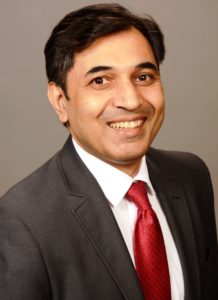Senior Director of Content Services, Cenveo Publisher Services

Please tell us a bit about yourself (e.g. hometown, current locale, course of study)
I was born and raised in Dehradun, India, in the foothills of the Himalayan Mountains. After completing my Engineering and MBA degree, I joined a company called Innodata, working as a Project Manager in their Noida facility, in the Delhi metroplex. Soon after, I moved to Manila, Philippines to lead the Engineering team in early 2004. Since then, I have moved to Dallas, TX, and lived here with my family for the past 12 years.
Because I came from a background rich with travel and experiences, Dallas has grown to become my home, as the city life, culture, and Texas-sized lifestyle marries together everything I enjoyed about my places of residence in the past. With large shopping malls, urban restaurants, and large parking spots Texas opens its doors to all. My family and I particularly enjoy going to the Texas State Fair every fall.
Describe some of your current responsibilities, and what type of organization you belong to.
For the past five years or so, I have been working with Cenveo Publisher Services as Senior Director of Content Services. We provide consultative and technology solutions to support editorial development, production processes and technical compliance for our clients. We have been serving the printing and content needs of publishers for over 100 years.
In my current role as a Business Development executive, I help publishers develop workflow strategies for publishing on the web and for mobile platforms, as well as for eBooks. I assist clients in reducing their costs of creating, managing, and distributing information; addressing their content creation; and publishing challenges.
What was your first scholarly publishing role? How did you get that job? What path led to your current position?
In my first role in scholarly publishing, I managed the outsourced Indexing and Abstracting workflow of STM journals for a large commercial publisher. As a Project Lead, I hired and trained a team to manage this work from our Noida facility in India. Successful execution of this and other outsourced content production projects opened doors for me to lead our engineering team, where I executed several successful initiatives involving analyzing our customer’s workflows, recommending automated solutions, and generating better turnaround times, which improved quality and saved costs.Towards the end of 2006, recognized by senior management for my advanced skills in publishing, I was offered a position to lead the publishing vertical of our company. I accepted that position with delight and have since been in the business development and various client facing roles, doing what I enjoy the most: solving business problems of our customers.
What tools, web sites and organizations do you find most valuable for your career development?
I have set up alerts to daily updates on industry information and news. l find Outsell’s Information Industry Headlines very useful. I try to attend at least 2 or 3 publishing events every year, including the SSP annual meeting. This gives me an opportunity to network and exchange ideas on new trends with peers and industry experts. Apart from being involved in the SSP committee work, I do enjoy being a member of the Project Management Institute (PMI), where I find useful information to sharpen my technical skills.
What advice would you give to people interested in a career in scholarly communications?
Scholarly communications has been impacted by the convergence of several new technologies. This has changed the way content is published and consumed. As new technologies evolve, we will continue to see new trends in this industry. People interested in a career in this industry should keep themselves updated on emerging technologies and explore ways to be early adopters of these technologies. For example, several companies in the publishing industry have already built some form of artificial intelligence, natural language processing and data analytics into their workflows. There is also a lot of discussion about how blockchain could be used in our industry.
Professional societies like SSP, CSE, ALPSP, etc provide several avenues to enhance your knowledge and skill about scholarly communications. Apart from knowledge sharing webinars and regional events, some of them have excellent mentorship programs for early career professionals. Taking advantage of one-on-one mentoring, networking at industry events and volunteering at these organizations could be a great way to learn about changes in the industry and result in enhancing your career in scholarly communications.

